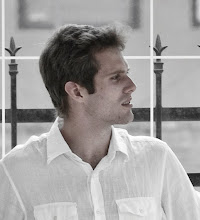I didn’t find
Skyfall quite as exuberantly thrilling as
Casino Royale or as captivatingly vexing as
Quantum of Solace but it is a more than worthy addition to the Daniel Craig Bond series. One of the most exciting things about these last three films is the filmmakers’ insistence to give each film a theme (or multiple themes). The films aren’t about ticking off the requisite Bond series traits checklist (although they do that, too). They each grapple with a theme. Whether it was gender in
Casino Royale or ‘bonds’ of friendship in
Quantum of Solace, all three of the Daniel Craig Bonds give the audience something to chew on.
The central theme in
Skyfall is the struggle between youth and old age. While the film doesn’t come down hard in either direction, there’s a sense that we must adapt to the times but we must not discard the past either. Bond is visibly older, his hair cropped short to show his receding hairline and the skin around his eyes increasingly craggy. When Bond grows out stubble he doesn’t look like a model on the pages of
GQ, he looks like an older man who has lost the will to groom. Similarly, when MI6 gets moved to a new location, their underground digs look ramshackle and weak rather than resembling a hip Silicon Valley office with its exposed brick and open plan seating.
In the battle between youth and wisdom, the subject of technology becomes a major part of the conversation. With the age of technology replacing the need for human-to-human immediacy, the relevancy of spies is questioned. When MI6 headquarters is compromised, it’s not through an invasion of armed attackers, it’s through a computer virus. Of course it’s nothing novel.
Live Free or Die Hard explored a similar question while also using a beloved franchise to frame the argument.
There is a sense that anyone can learn how to use a computer. The casting of Ben Whishaw as Q is simultaneously a stroke of genius and also 17 years late. Meanwhile, Javier Bardem’s villain sure doesn’t seem like a computer genius which gave me the feeling like he had an unidentified band of computer hackers that we never see – a subject avoided by the film: perhaps the anonymous computer hackers don’t even know who they’re working for? In this day and age it does feel more realistic that a super villain would have access to a legion of computer hackers than to an army of muscle-bound henchman marching headfirst into death.
Skyfall seemingly wants to have it both ways. It begins by showing the likeliness of human error and then illustrates the precision and alacrity capable with remote computer technology but ultimately concludes with a proud stamp celebrating James Bond’s endurance in its 50th anniversary at the cinema.
As much as the film wrestles with the issue of aging and finds multiple touch points, it doesn’t make a firm decision either way. It seems to be suggesting the answer is a balance of both – most perfectly captured in the barbs traded by Q and Bond in the National Gallery Museum. “Youth doesn’t guarantee innovation,” being my favorite. But I couldn’t help but feel the end of the film restores a regressive viewpoint with the reprisal of female secretary Moneypenny and a gender rebalancing that reverts the progressive element introduced in 1995’s
Goldeneye. This image is perhaps more symbolic than literal – Judi Dench’s M is characterized as harder nosed than Ralph Fiennes’ MP Gareth Mallory after all. But then he’s still the one jumping over desks and jumping in the line of fire while M’s call to action is setting light bulb-based booby-traps and later admitting her embarrassment over her poor gun performance.
Amidst some tremendous action sequences (in particular the Shanghai high-rise fist fight and the chase through the London Underground) the film still feels most vital when director Sam Mendes recalls his
American Beauty roots in the moments that feature the tease of uneasy sexual exploration hinted at between Bardem’s villain and Bond or during the film’s inspired conclusion at Bond’s childhood home.
Casino Royale established that the new Bond was resolutely a human being with emotions and fears.
Quantum of Solace continued this exploration by creating a Bond film that was essentially a revenge picture and now
Skyfall crystalizes this pursuit by arguing the importance of human consideration in an increasingly virtual world. To underline this point, it turns the film’s concerns from the national to the personal with Bond returning home to protect his surrogate Mother and Father from intruders. I appreciated the hints of both
Straw Dogs and
Jane Eyre in this bravura set piece that I’d never have imagined to see in a Bond film before. The sequence is both thrilling and thematically rich. It’s the main reason to see this film.
Is Bond still relevant?
Casino Royale proved to audiences in 2006 that he definitely was. But the filmmakers still feel required to address it in 2012. There’s the usual casting rumors floating through Hollywood about the next Bond and while I think Craig is due for at least one more go around, the arc in
Skyfall makes a nice case for calling it a day with the tidy character progression illustrated in this trilogy.
Casino Royle did, after all, begin with Bond becoming a 00 agent.














